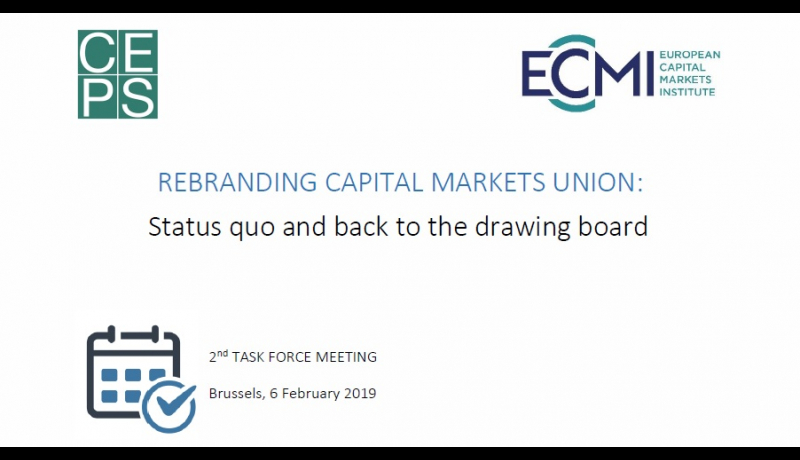Second Meeting - Task Force on Rebranding CMU
AGENDA
12:00 – 13:00 Registration & lunch
13:00 – 13:15 Introductory remarks
- Chairman: Vítor Constâncio, former ECB Vice-President, and current President of the Council of the Lisbon School of Economics & Management (ISEG)
- Rapporteurs: Karel Lannoo, CEO of CEPS and General Manager of ECMI, and Apostolos Thomadakis, Researcher, CEPS-ECMI
13:15 – 14:30 Session 1. Completing the funding escalator for young, small and innovative firms
Diversifying firms’ funding sources beyond bank financing and towards more capital market solutions, is one of the primary scopes of the CMU. High-risk companies may particularly benefit from improved access to the capital markets, which can not only provide start-up financing but also financing options for companies in the growth phase. However, obstacles on both the supply-side (e.g. savings patterns inclining towards bank deposits, insolvency law, underdeveloped financial literacy) and the demand-side (e.g. disclosure requirements, debt preferential tax treatment) hamper access to capital markets.
- Why firms, particularly SMEs and high-growth potential firms, prefer to not enter and raise capital on public and private capital markets?
- Does the current capital market ecosystem allow SMEs to grow, mature and reach their full potential?
- How retail and institutional investors’ participation in capital markets can be fostered? Does the current supply of products meet their real savings/investment needs?
Presentations
- Ulrika Renstad, Head of Business Development, Listing Services, Nasdaq Nordic
- Cornelius Mueller, Research Director, Invest Europe
Roundtable discussion
14:30 – 14:45 Coffee break
14:45 – 16:00 Session 2. Increasing private risk-sharing through a European safe asset
The removal of barriers to financial integration, that will reduce frictions and create a common capital market, is the corestone of the CMU. A major step forward towards this direction is a safe asset. Such asset will not only contribute to risk sharing and to reducing financing constraints, but it will also increase liquidity and market depth (both of debt and equity) by boosting cross-border capital flows and foreign direct investments. While there is a general agreement that a safe asset would be a valuable addition to achieve grearter financial integration, its implementation is still a while away.
- Does Europe need a common safe asset?
- Are sovereign-bond backed securities (SBBSs) the right option? What are the alternatives (European Safe Bonds, national tranching, E-bonds, ESM bonds)?
- Can structural dispersion across countries (in terms of debt stock, private sector liabilities, growth rate) and lack of political consensus be overcomed?
Presentations
- José Leandro, Director for Policy, Strategy and Communication, DG ECFIN, European Commission
- William De Vijlder, Group Chief Economist, BNP Paribas
Roundtable discussion
16:00 – 17:15 Session 3. Supervisory framework for integrated capital markets
With the CMU being a moving target, its institutional architecture becomes evolutionary and challenging. A supervisory architecture fit for the CMU should aim at increasing financial market integration and removing barriers which still fragment capital markets, while at the same time ensuring financial stability. Moreover, it should do that by aknoweldging and protecting the heterogeneity of the project, both in terms of market players and products. Even though it has been, since the crisis, a significant focus on building single rulebooks for different sectors (e.g. banking, insurance), questions and challenges still remain on how the consistent implementation of a single rulebook can be achieved.
- How enhanced levels of consistency and convergence between supervisors can be ensured?
- Is strengthened cooperation between national authorities sufficient? Or are there areas that require centralasation of responsibilities?
- How regulatory embeddedness among member states can be eliminated, and forces of short-term efficiency and protectionism slowed down?
Presentations
- Martina Tambucci, Head of Regulation, CONSOB
- Fabrice Demarigny, Global Head of Financial Advisory Services and Capital Markets Activities, Mazars
Roundtable discussion
17:15 – 17:30 Conclusions & next steps
PARTICIPATION
- This is a closed-door meeting and the participation is limited to the members of the Task Force, academic/policy/industry observers and selected invitees. Detailed information is available here.
- Please do not hesitate to contact Apostolos Thomadakis by email at: [email protected] or by phone on +32 222 93 914.

